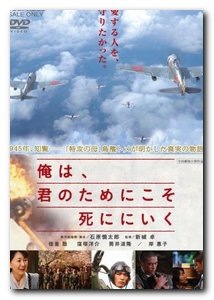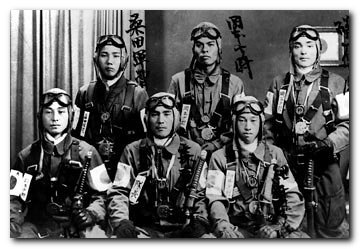 Ore wa, kimi no tame ni koso shini ni iku (2007) – on rental. Ore wa, kimi no tame ni koso shini ni iku – or “For Those We Love” – opens with a scene of a kind-looking and elderly Japanese woman who remembers fondly the boys who used to visit and patronize her restaurant many years ago.
Ore wa, kimi no tame ni koso shini ni iku (2007) – on rental. Ore wa, kimi no tame ni koso shini ni iku – or “For Those We Love” – opens with a scene of a kind-looking and elderly Japanese woman who remembers fondly the boys who used to visit and patronize her restaurant many years ago.
These boys were the ‘volunteers’ for the famed Kamikaze units that flew suicide missions: their planes intentionally rammed into the Allied ships in 1945. Many of these units operated out of an airbase in Chiran, and her nearby restaurant served as an eatery for these young pilots for their last meals before they flew on their one-way missions the next morning.
—
One of the more thorny issues in this part of the world that dogs Chinese relations with the Japanese remains the latter’s alleged reluctance to face up squarely to their conduct during the second world war 60 years ago.
A lot has been said in media about the sentiment that the Japanese perspective that they were fighting a just and moral war, and the issue flares up again whenever their leading politicians visit some war shrine, or there’s some new textbook that whitewash the Nanking Massacre.
Their film productions have been along the same vein. There’s been a couple of films covering this period of history in the last decade, and they invariably are about the same theme: honoring and remembering the bravery of their war heroes, and (at times) not so subtly reminding the world of the vengeance returned by the Allied forces in the form of the Tokyo firebombings and the two atomic bombs on Hiroshima and Nagasaki.
 For Those We Love establishes the Japanese perspective early on. They believed in what they were doing, calling their struggle valid and just. In order for Japan to survive the upcoming confrontation with the massing Allied forces south of Kyushu, “Young men must die. It is the only way”, Vice-Admiral Takijirō Ōnishi in the film muses.
For Those We Love establishes the Japanese perspective early on. They believed in what they were doing, calling their struggle valid and just. In order for Japan to survive the upcoming confrontation with the massing Allied forces south of Kyushu, “Young men must die. It is the only way”, Vice-Admiral Takijirō Ōnishi in the film muses.
The story is told from Tome Torihama’s perspective, the elderly Japanese restaurateur. Torihama was a real life person – Time magazine has an article on her here. The pilots are as young as 17, and upon completing their flight training are posted to an airbase in Chiran, where they received their mission orders – which involve ramming their planes into allied ships. Some of the pilots are resigned, some are full of bravado, some are retrospective; and many write farewell letters to their mothers.
In their free time, they dine at Torihama’s Tomiya Restaurant, who looks after the boys with a mix of pride, sadness and resignation as she knows what lies ahead of them. She tries to give them additional liberties for example by letting them stay at her restaurant after curfew hours, or smuggling out their letters. She does this because she reasons that they were about to die, and deserve to live their last moments to the fullest. Her actions put her against the wrath of the local Kempeitai, or Military Police, who insist that rules must be obeyed by all, and she suffers beatings as a result.
Continued in the next post.
Recent comments